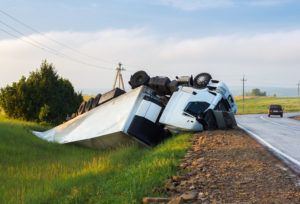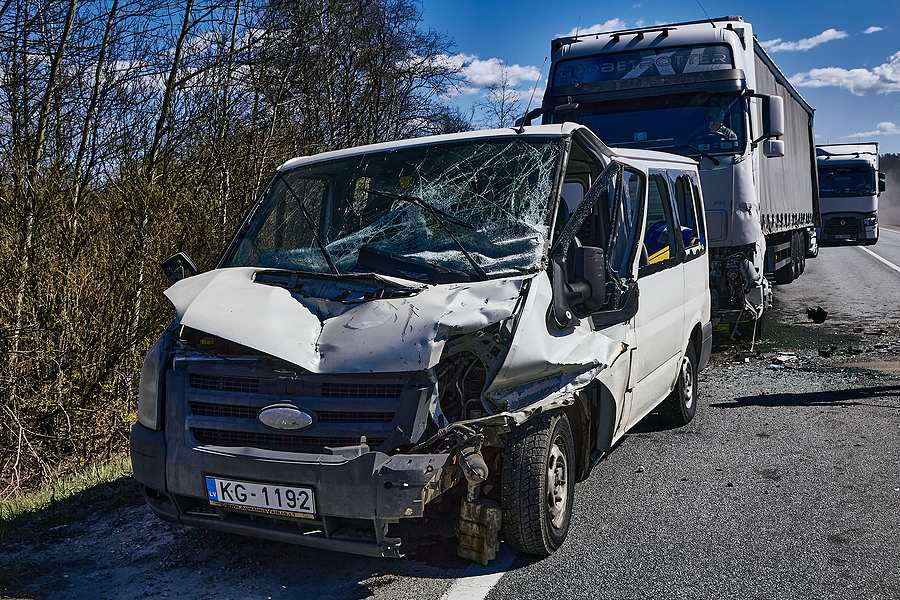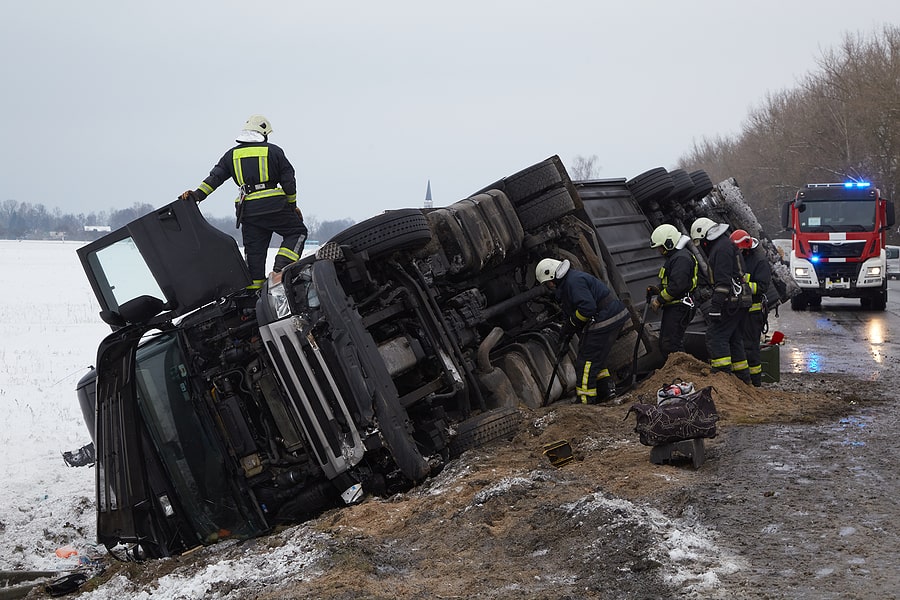 When a loved one dies in a trucking accident, the surviving family will not just suffer emotional damage. The family will also suffer financial injuries due to the loss of the deceased family member. This post will look at recovering damages after a death in a trucking accident.
When a loved one dies in a trucking accident, the surviving family will not just suffer emotional damage. The family will also suffer financial injuries due to the loss of the deceased family member. This post will look at recovering damages after a death in a trucking accident.
For a free legal consultation, call 516-451-7900
Wrongful Death Claims
A wrongful death claim stands in the place of the personal injury claim that the deceased victim could make if they had not died.
Who Can Bring the Claim?
Each state has rules regarding who can file a claim. For example, in New York, only certain parties may bring a wrongful death suit.
Those parties are:
- Surviving child of the decedent
- Surviving parent of the decedent
- Surviving spouse of the decedent
- The personal representative of the decedent’s estate
- Distributee of the Estate
In general, siblings and cousins don’t have a right to bring a wrongful death suit unless they were the guardian or personal representative of the deceased. However, if one of the above-listed eligible parties exists, a personal representative brings the claim on behalf of the closest family members – not themselves.
Click to contact our personal injury lawyers today
Pain and Suffering Case
Generally, the courts will join a wrongful death case with the case for pain and suffering experienced by the decedent before death. Some state laws allow these pain and suffering claims to survive the decedent’s death and do not cap the potential damages.
To make this happen, at death, the pain and suffering claim is immediately legally transferred to and is a part of the decedent’s estate. The estate’s personal representative can then bring the claim on behalf of its beneficiaries. The representative will then distribute any award as part of the estate assets to the beneficiaries.
Complete a Free Case Evaluation form now
Who Can Benefit from the Wrongful Death Claim?
Those who can benefit from the wrongful death claim include specific family members and those who were financially dependent upon the decedent. This claim is not part of the estate, and the beneficiaries are not limited to those who are heirs of the estate.
Some wrongful death statutes carefully lay out the distribution of any award in a wrongful death claim.
Those eligible to take action under the law and what they may pursue include:
- With a spouse with no children, the spouse receives the entire award.
- Spouse with children, the spouse receives $50,000, the remainder split in half between spouse and children, with the children’s share divided equally among them.
- With children with no spouse, the entire amount is split equally among the children.
- Parent(s) but no spouse or children, the entire award goes to parents; if they are no longer married, the court divides the award 50/50.
- If no spouse, children, or parents, the court divides the award equally among the decedent’s siblings; if no siblings, then nieces and nephews share the award.
Note that the beneficiaries who can receive the pain and suffering award and the parties who can receive the wrongful death award are not necessarily the same. The decedent might have left an entire estate to the Flat Earth Society; if so, they will take the whole pain and suffering award.
When Do They Have to File?
The personal representative must file any wrongful death claims within two years of the decedent’s death. The survivorship action for the decedent’s pain and suffering is the length of three years from the date of the accident or one year from the date of death.
There are exceptions to these time periods. For example, if a criminal case is pending against the person responsible for the death, the statute of limitations becomes one year from when the criminal case ends. Additionally, the time period could be much shorter, for example, when dealing with a municipal or governmental defendant.
What Must the Plaintiff Show?
Because the personal representative essentially steps into the decedent’s shoes, the ability to recover depends primarily on whether the decedent would have had actionable damages to recover if they lived.
In other words, the plaintiff must show that:
- The act of negligence will have entitled the decedent to file an action to recover damages, including pain and suffering, had the decedent survived.
- There are surviving spouses, children, or parents of the deceased.
- The survivors have suffered monetary damages resulting from the death.
What Can They Recover?
The law awards damages to the survivors in a wrongful death case to make them whole from their losses resulting from the decedent’s death. The amount and nature of the damages awarded are a matter of the facts and circumstances of each case.
Typical damages can include:
- Funeral and burial/cremation expenses for the decedent—presently paid invoices.
- Health care expenses arising from the decedent’s final illness or injury—paid hospital bills, prescription receipts, doctor’s bills, etc.
- The value of support or services the decedent might have provided to the family—demonstrate wages, etc., that decedent had been providing.
- The value of parental care and guidance the decedent might have provided to the children—may require expert testimony to consider replacement care costs and the monetary value of guidance.
- Any financial support decedent might have given the family—again, use payroll and salary records.
- Any inheritance lost by survivors—expert testimony may be required to demonstrate what decedent was likely to have earned, saved, received in bonuses, etc.
- Interest in the award dating from the date of death
- Decedent’s pain and suffering from the date of injury/illness to death—expert testimony likely needed; note that both psychological and physical pain are compensable.
- Loss of companionship
How Likely Is Death in A Trucking Accident?
Truck accidents are increasing sharply, having increased by more than half since 2009. They account for three out of four-passenger vehicle fatalities. Well, more than 100,000 people suffer injuries in truck accidents annually. More than 4,000 of them also die each year.
A pedestrian hit by a commercial truck will, at the very least, be seriously injured. In a collision between a large truck and a passenger car, any deaths usually strike the car’s occupants.
Trucks have tremendous size and mass advantages over any vehicle they hit on the road. Because of this, injuries in any given truck/car collision tend to be catastrophic, and death is not uncommon.
Most Common Types of Truck Accidents
As we mentioned earlier, truck accidents may cause catastrophic injuries, accounting for almost one in ten fatal crashes.
Several types of accidents are among the more common truck statistics.
- Rollovers – A rollover is an accident in which the truck rolls onto its side, top, or even completely over. These accidents happen when the truck’s wheels hit a ditch, curb, or ledge and knock it off balance. They are among the most catastrophic motor vehicle accidents that happen. Trucks are prone to rollovers because of their high center of gravity. A poorly loaded cargo can make this issue even riskier. Sometimes, of course, excessive speed or distracted driving will also contribute to a rollover. Sometimes, the driver did nothing to cause the rollover; the government may have failed to repair the road, or a tire may blow out, the latter a common cause of rollovers. Rollovers are also common with tanker truckers. Even those with dividers inside to limit the cargo movement still tend to be taken off-balance, leading to rollovers. These vehicles often carry hazardous or explosive contents that can explode in the rollover, making these accidents even more dangerous.
- Rear-End Collisions – In a rear-end collision with a truck, the difference in mass and weight between the truck and the car is fatal. If the truck rear-ends a car, it will likely get crushed at impact. If, on the other hand, the car rear-ends the truck, the car can go under the truck if it does not have proper guards. In that case, the collision can shear off the top of the car and often the heads of the passengers as well. For this reason, federal and state laws now require that large trucks have guards at the rear to prevent cars from driving under the back of the truck.
- Head-On Collisions – When truck drivers lose control of their vehicles, are distracted, or fall asleep behind the wheel, they can drift into the oncoming traffic lane, causing a head-on collision. These accidents also happen are intersections and other areas where drivers do not yield the right of way. Truck drivers may experience head-on collisions when they fall asleep from driving too many hours or crash from over-the-counter stimulants. Distractions like cell phones and texts can also cause accidents, as can the blowouts that often cause rollovers.
- Jackknifes – Jackknives happen when a truck with joints makes an improper turn or brakes. The forces hit the truck, causing it to swing the trailer around wide on its pivot point and fold at the joint like a knife. The high level of danger in this accident comes from how unpredictable it can be with the trailer skidding and even pushing the truck and other vehicles into additional lanes of traffic. A common cause of these accidents is poor braking behavior, especially in bad weather. Braking too fast when roads are wet or icy can cause the trailer to fishtail and then skid to one side, leading to a jackknife. Even if the truck does not hit anyone else, other cars will likely hit them.
- T-Bone Accidents – T-bones almost always happen at intersections. They occur when one vehicle hits another at a 90-degree angle, forming a T. A truck traveling at higher speeds through an intersection may ignore the traffic sign or signal and hit a driver in the crossing traffic with the right of way. The truck’s mass and size, especially if it hits the relatively unprotected passenger side of the vehicle, will cause life-shattering injuries.
- Wide-Turn Accidents – Wide turn accidents often happen at right turns, which are difficult for large trucks to navigate because they are so tight. So, many drivers make the turn extra-wide, potentially hitting vehicles in the other lanes. Vehicles in other lanes may also hit the truck or get cause underneath it as it swings out wide into traffic.
Who Can You Hold Liable for Your Damages?
Truck accident liability is a complicated question. Under the correct facts and circumstances, the driver and the company may be liable for your damages. In addition, you can hold the companies that designed, made, and maintained the truck, and those that trained the drivers, liable for your damages.
Working with a truck accident attorney who understands these complex liability issues and will know to avoid the first few settlement offers may be the best stop you can take in a wrongful death suit arising out of a trucking accident.
Can I Afford a Wrongful Death Suit?
Definitely. Wrongful death attorneys, like personal injury lawyers, take most cases on a contingency fee basis. You have undoubtedly seen lawyer advertisements saying, we win, or you don’t pay anything. That describes a contingency fee arrangement.
Under that arrangement, you will enter into a written fee agreement with your attorney. That agreement will state that you will only pay attorneys’ fees if your attorney resolves your case in your favor. That means if your attorney settles or receives an award.
The agreement will also state what portion of the award your attorney will receive and whether that portion changes depending on the stage of the litigation at which the case ends. The agreement must also describe how the attorney will handle costs and filing fees.
Wrongful death is complex and full of traps for the unwary, unskilled individual. When you don’t know about the course of your life and are very much still in mourning for your loved one, you should focus on your family and your physical and mental healing.
Let an attorney experienced in truck accident wrongful death cases take this one burden off your shoulders. They can handle the negotiation, value your claim, and retain experts needed to predict future costs. Now is not the time for you to be self-reliant or strong and silent.








